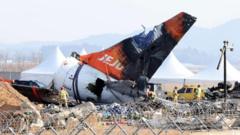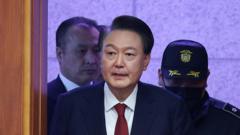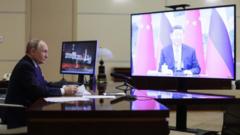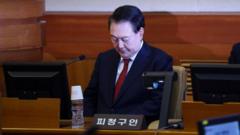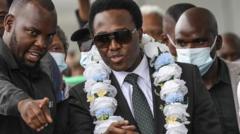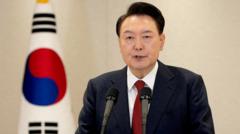The indictment of Yoon Suk Yeol marks a significant moment in South Korea's political landscape, drawing public scrutiny and raising questions about governance and accountability.
South Korea's Impeached President Faces Insurrection Charges

South Korea's Impeached President Faces Insurrection Charges
Yoon Suk Yeol, formerly the President of South Korea, is indicted after a contentious martial law period.
South Korea is undergoing a political upheaval as its impeached president, Yoon Suk Yeol, has been formally indicted on insurrection charges. This indictment stems from Yoon's controversial decision to impose martial law on December 3, claiming that the opposition-controlled National Assembly was obstructing his government’s operations. The martial law was in effect for only six hours before being overturned, but it ignited the most severe political crisis the nation has faced in decades.
In a historic turn of events, Yoon is the first sitting president in South Korea to face criminal charges. Following his indictment, a former defense minister and several high-ranking military officials have also been charged for their roles in the martial law actions. Public sentiment surrounding Yoon has turned largely against him, with polls indicating that a majority of South Koreans support his impeachment and view him as guilty of insurrection.
Yoon's situation has escalated since he was impeached by the National Assembly on December 14, which led to his suspension from office. As the Constitutional Court deliberates on the legitimacy of this impeachment, Yoon remains in jail after being arrested on January 15. Despite his imprisonment, he has vowed to fight for his reinstatement, reflecting a deep divide in public opinion.
Supporters of Yoon have branded the impeachment process as a “fraud,” leading to violent protests, including vandalism at a courthouse in Seoul and subsequent arrests. Prosecutors accuse Yoon of extreme measures during his brief martial law, including commands to military officers to forcibly break into the Assembly to detain lawmakers. As this situation unfolds, it raises pressing questions about governance, legal accountability, and democracy in South Korea.
In a historic turn of events, Yoon is the first sitting president in South Korea to face criminal charges. Following his indictment, a former defense minister and several high-ranking military officials have also been charged for their roles in the martial law actions. Public sentiment surrounding Yoon has turned largely against him, with polls indicating that a majority of South Koreans support his impeachment and view him as guilty of insurrection.
Yoon's situation has escalated since he was impeached by the National Assembly on December 14, which led to his suspension from office. As the Constitutional Court deliberates on the legitimacy of this impeachment, Yoon remains in jail after being arrested on January 15. Despite his imprisonment, he has vowed to fight for his reinstatement, reflecting a deep divide in public opinion.
Supporters of Yoon have branded the impeachment process as a “fraud,” leading to violent protests, including vandalism at a courthouse in Seoul and subsequent arrests. Prosecutors accuse Yoon of extreme measures during his brief martial law, including commands to military officers to forcibly break into the Assembly to detain lawmakers. As this situation unfolds, it raises pressing questions about governance, legal accountability, and democracy in South Korea.






